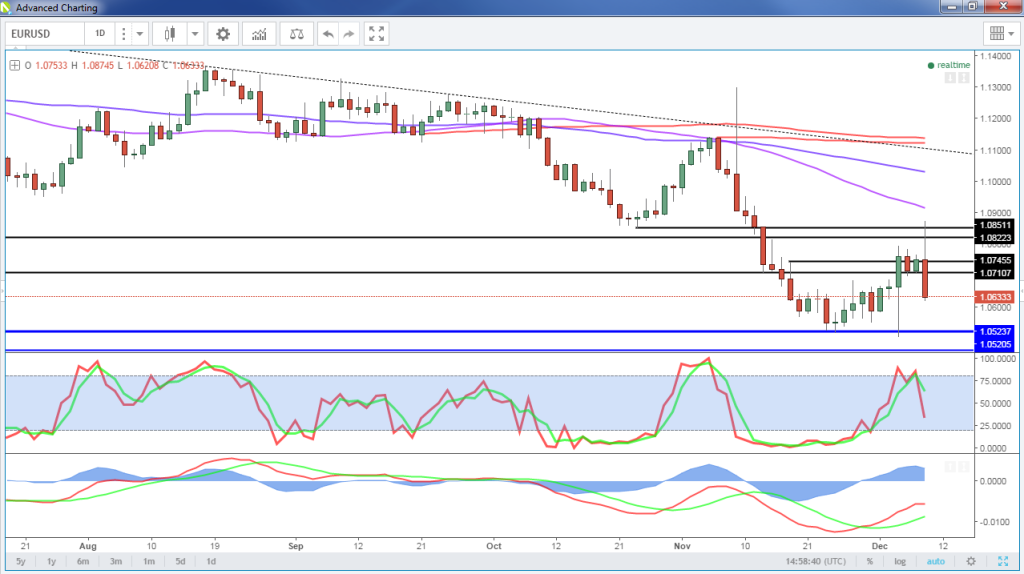Post Announcement Reaction
The ECB announced today that it will begin tapering (or not as Draghi later claimed, just something that strongly resembles it) its asset purchases from April next year in a clear sign that it is reaching the limits of what it is willing to do under the bond buying program. It’s clear that there were other options available to the ECB today and yet, there was not the support within the monetary policy committee to enact such changes.
Despite an initial spike, the euro is not behaving like a taper has just been announced and instead is making new lows for the day. The reason for this is that we have not just had a normal tapering of QE, the ECB has delivered a taper with a twist. The number of purchases has been reduced but the expiry has been pushed back to December, rather than September which is what was expected.
USD/JPY – Yen Dips on Mixed Japanese Numbers
The result is that the ECB has committed to buying €540 billion of debt rather than €480 billion, which it would had the monthly bond purchases not been reduced and the program extended by six months. While this may be a neat little trick by the governing council, it’s only technically a larger stimulus package if they would have otherwise reduced purchases to zero from September, which is extremely unlikely.
That being the case, what we’ve seen today is Draghi and the ECB playing the game and with the euro currently lower, they’re winning. The reality is that this is still a tapering and still less stimulus than the markets were pricing in.
Politics Not Fundamentals Guides the ECB
Draghi Announces QE Parameter Changes
Mario Draghi had one very clear message during today’s press conference that he was determined to get across, today’s reduction in asset purchases to €60 billion is absolutely NOT TAPERING. While Draghi, along with a couple of other changes to the QE program, may have succeeded in talking down the euro, many people remain unconvinced by the ECBs actions.
OANDA fxTrade Advanced Charting Platform
One issue is the decision to reduce asset purchases from €80 billion to €60 billion while at the same time acknowledging that inflation in 2019 will “not really” be in line with target, according to its latest projections. Reducing stimulus while reporting below target expectations is certainly a very odd combination unless of course, the former is not being driven by the latter.
0.2% in 2016 (0.2% in Sept)
1.3% in 2017 (1.2%)
1.5% in 2018 (1.6%)
1.7% in 2019
One welcome change to the program, which may largely explain the moves in the euro was the removal of the deposit rate floor for the debt it is allowed to purchase, which should in theory improve the bond scarcity issue. As should the widening of the maturities available for purchase to 1 year to 30 years (from 2 years to 30 years).
Regardless of what we want to call it, the fact is that the amount of stimulus from April next year has been reduced despite the ECB itself acknowledging that it doesn’t expect to achieve its target by 2019. Something is clearly not right, either the central bank is concerned that QE is reaching its limits or we’re seeing a “tapering” of support for it.
Content is for general information purposes only. It is not investment advice or a solution to buy or sell securities. Opinions are the authors; not necessarily that of OANDA Business Information & Services, Inc. or any of its affiliates, subsidiaries, officers or directors. If you would like to reproduce or redistribute any of the content found on MarketPulse, an award winning forex, commodities and global indices analysis and news site service produced by OANDA Business Information & Services, Inc., please access the RSS feed or contact us at info@marketpulse.com. Visit https://www.marketpulse.com/ to find out more about the beat of the global markets. © 2023 OANDA Business Information & Services Inc.



